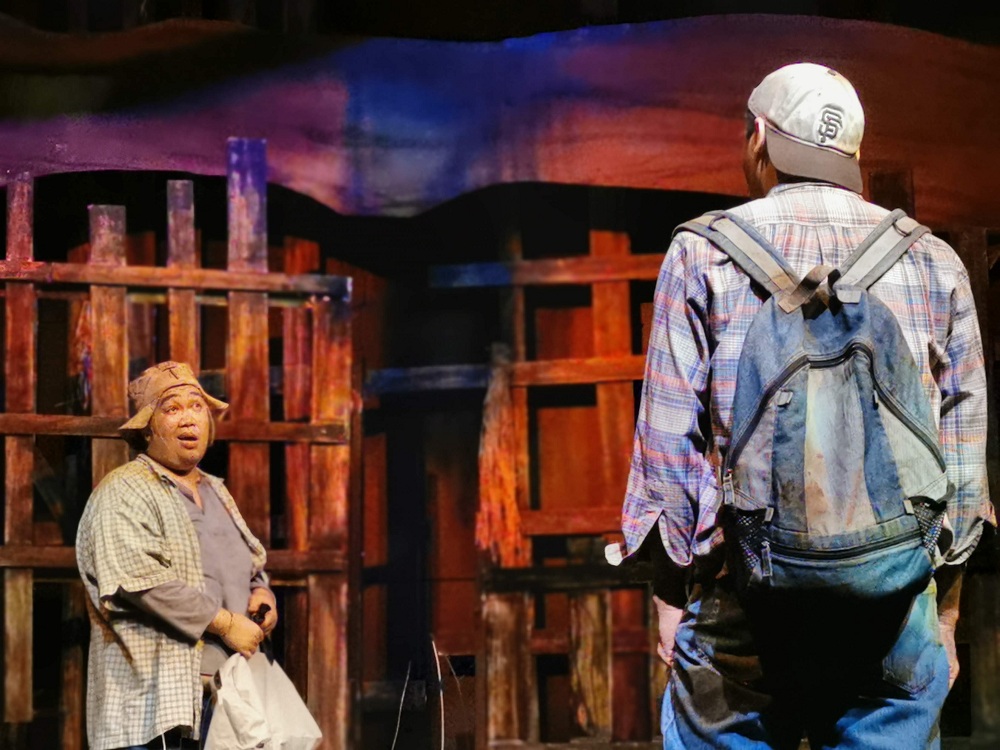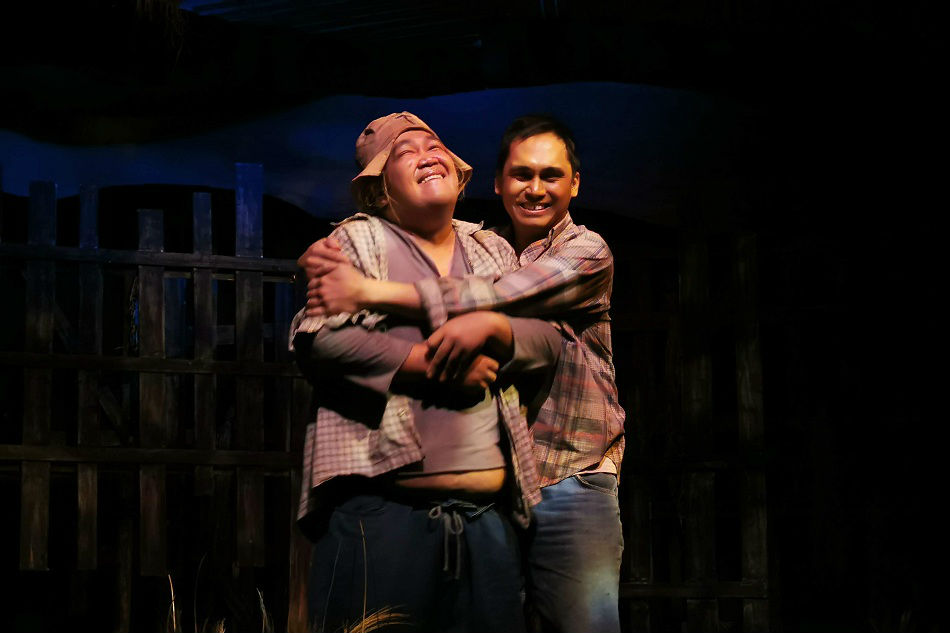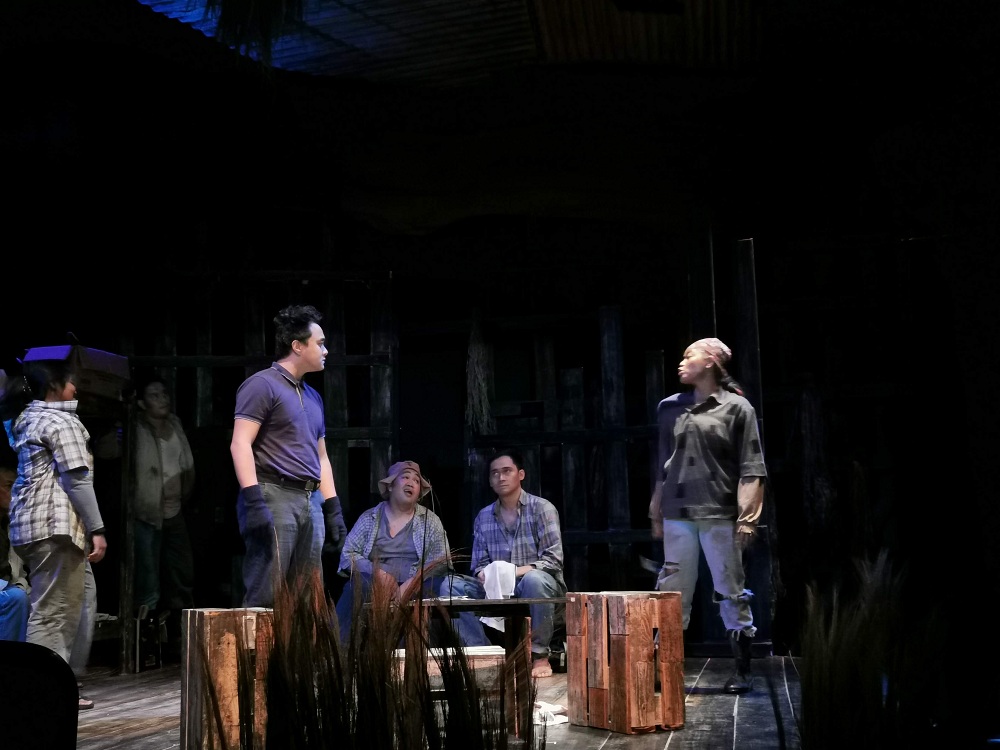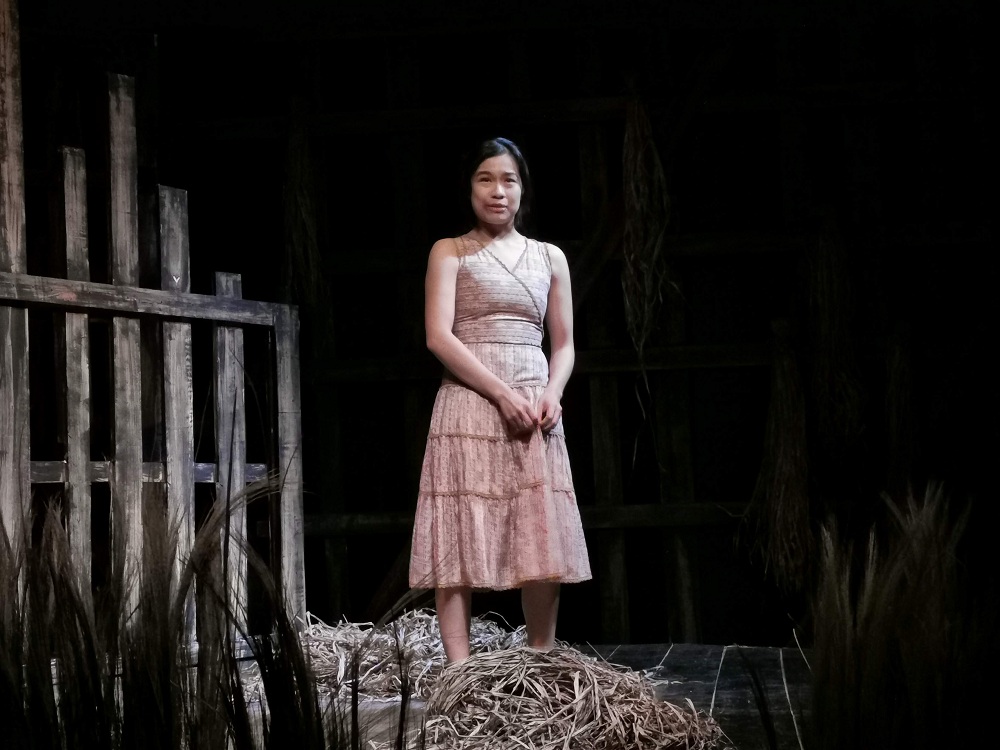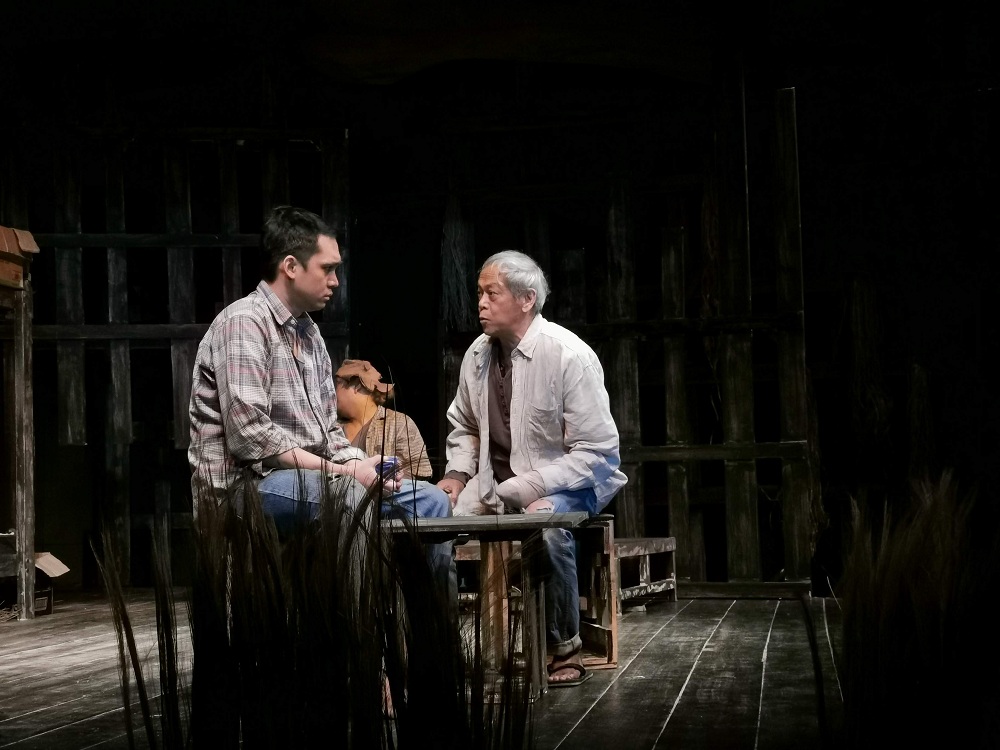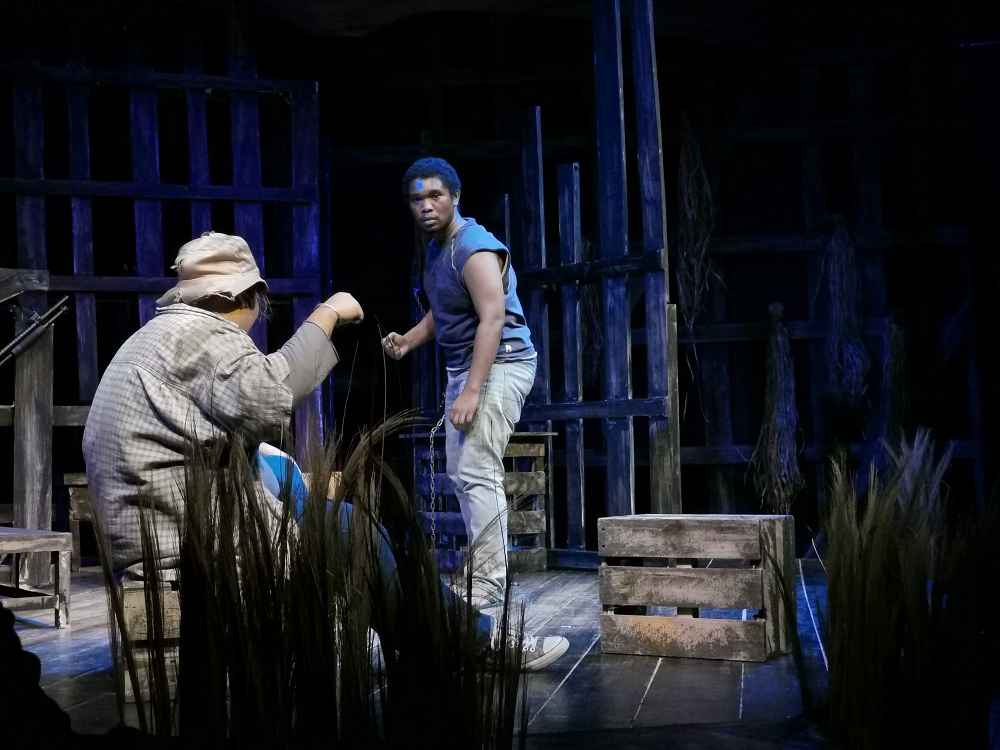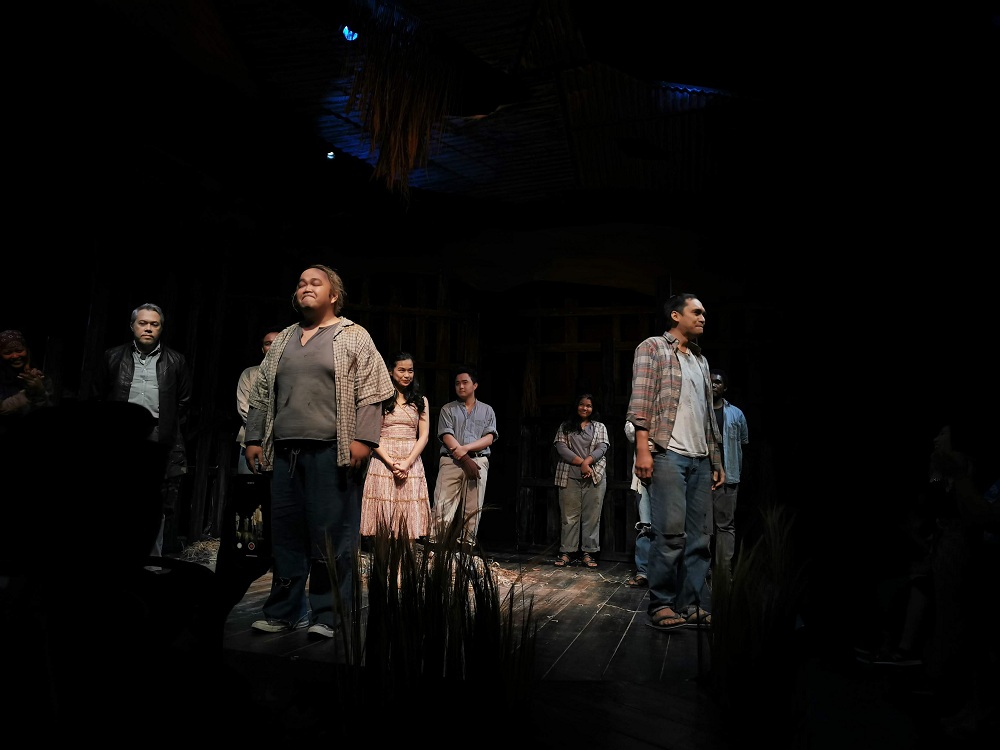Theater review: Scrambling to escape the tigkiriwi in TP's 'Katsuri' | ABS-CBN

Welcome, Kapamilya! We use cookies to improve your browsing experience. Continuing to use this site means you agree to our use of cookies. Tell me more!
Theater review: Scrambling to escape the tigkiriwi in TP's 'Katsuri'
Theater review: Scrambling to escape the tigkiriwi in TP's 'Katsuri'
Inday Espina-Varona
Published Oct 06, 2019 11:16 AM PHT
MANILA -- The masked, camo-clad man slinks out of the dark. He is on a hunt, tracking prey who scramble and stumble through scrub in futile attempts to escape.
MANILA -- The masked, camo-clad man slinks out of the dark. He is on a hunt, tracking prey who scramble and stumble through scrub in futile attempts to escape.
They fall.
They fall.
A woman in a suit declaims, in tones pitched to sway judges, of searing heat and parched earth, and how hunger blankets the land, sending even grown men to their knees.
A woman in a suit declaims, in tones pitched to sway judges, of searing heat and parched earth, and how hunger blankets the land, sending even grown men to their knees.
She falls.
She falls.
ADVERTISEMENT
The cackle of gunfire runs through Tangalang Pilipino’s “Katsuri.” An adaptation of “Of Mice and Men,” Nobel laureate John Steinbeck’s black ode to brotherhood, it has death’s bark as the dark twin of its main musical theme -- the Ilonggo lullaby “Ili-ili.”
The cackle of gunfire runs through Tangalang Pilipino’s “Katsuri.” An adaptation of “Of Mice and Men,” Nobel laureate John Steinbeck’s black ode to brotherhood, it has death’s bark as the dark twin of its main musical theme -- the Ilonggo lullaby “Ili-ili.”
Dulcet guitar tones float out at a pause in the bloodletting.
Dulcet guitar tones float out at a pause in the bloodletting.
Two men tramp up the aisle. The first crumples, back bent with the efforts of rescue and flight. The second man, brawny, with the rocking gait of a child, kneels and then sprawls on his belly. He gulps and slurps creek water. His friend pulls him away. The stench -- a mix of rotten egg and banked flames -- is a mainstay in rural sugarlandia, a signal that sugar mills and refineries have released molasses waste into waterways.
Two men tramp up the aisle. The first crumples, back bent with the efforts of rescue and flight. The second man, brawny, with the rocking gait of a child, kneels and then sprawls on his belly. He gulps and slurps creek water. His friend pulls him away. The stench -- a mix of rotten egg and banked flames -- is a mainstay in rural sugarlandia, a signal that sugar mills and refineries have released molasses waste into waterways.
Familiar themes
From these opening vignettes to the final, silent freeze in the heavy, pressing air of an approaching storm, Bibeth Orteza’s adaptation of the 1937 classic flings Manila’s audience into the chaos of hearts and minds battling to keep dreams afloat behind the bars of serfhood.
From these opening vignettes to the final, silent freeze in the heavy, pressing air of an approaching storm, Bibeth Orteza’s adaptation of the 1937 classic flings Manila’s audience into the chaos of hearts and minds battling to keep dreams afloat behind the bars of serfhood.
TP, the resident theatre company of the Cultural Center of the Philippines (CPP), has for nine years aimed to mount the Steinbeck play, so much so that many actors have memorized the (English) lines.
TP, the resident theatre company of the Cultural Center of the Philippines (CPP), has for nine years aimed to mount the Steinbeck play, so much so that many actors have memorized the (English) lines.
ADVERTISEMENT
Orteza’s started her script last year, with the first rash of killings on Negros island, the country’s boot-shaped sugar capital. She picked up speed early this year when assassins shot dead her main consultant on the social and economic tugs of war in Negros. Bernardino Patigas, an activist turned politician, had survived the 1985 massacre of protesters in Escalante City, believed ordered by a henchman of the late dictator Ferdinand Marcos. He did not survive a death squad, one of many unleashed on more than 200 activists under President Rodrigo Duterte’s rule.
Orteza’s started her script last year, with the first rash of killings on Negros island, the country’s boot-shaped sugar capital. She picked up speed early this year when assassins shot dead her main consultant on the social and economic tugs of war in Negros. Bernardino Patigas, an activist turned politician, had survived the 1985 massacre of protesters in Escalante City, believed ordered by a henchman of the late dictator Ferdinand Marcos. He did not survive a death squad, one of many unleashed on more than 200 activists under President Rodrigo Duterte’s rule.
Katsuri, an animal part mouse, part shrew, used to roam free beneath the sugarcane stalks but has now been declared an endangered specie. It is an emblem of the sugar workers, not quite slaves but neither free, trapped into a perpetual cycle of debt and poverty that no amount to roaming breaks.
Katsuri, an animal part mouse, part shrew, used to roam free beneath the sugarcane stalks but has now been declared an endangered specie. It is an emblem of the sugar workers, not quite slaves but neither free, trapped into a perpetual cycle of debt and poverty that no amount to roaming breaks.
Headlines today show so many things unchanged from when Negros was called the social volcano in the early '70s: many workers continue to earn P80 to P120 for a day’s work, when there is work. Only two years ago, farm hands escaped the Luzon mainland’s most famous plantation, detailing how rent for hovels, for food that could barely sustain their back-breaking labor, their toiletries, even the bolos and other implements used on the master’s cane, were docked from already measly wages.
Headlines today show so many things unchanged from when Negros was called the social volcano in the early '70s: many workers continue to earn P80 to P120 for a day’s work, when there is work. Only two years ago, farm hands escaped the Luzon mainland’s most famous plantation, detailing how rent for hovels, for food that could barely sustain their back-breaking labor, their toiletries, even the bolos and other implements used on the master’s cane, were docked from already measly wages.
Negros is a setting that can prompt a descent into manifesto theater. But Orteza and director Carlitos Siguion-Reyna manage to lay out in clear terms just how the personal is the political, without resulting to irritating pedantry.
Negros is a setting that can prompt a descent into manifesto theater. But Orteza and director Carlitos Siguion-Reyna manage to lay out in clear terms just how the personal is the political, without resulting to irritating pedantry.
Steinbeck’s migrant field hands George (Marco Viaña)and Lennie (called Toto here, played by Jonathan "Tad" Tadioan) transport into a Negros hacienda.
Steinbeck’s migrant field hands George (Marco Viaña)and Lennie (called Toto here, played by Jonathan "Tad" Tadioan) transport into a Negros hacienda.
ADVERTISEMENT
George is still whacked from the latest flight forced by the accidents that befall Lennie, a child with a giant’s strength, whose social filters evaporate in any setting absent of his guardian.
George is still whacked from the latest flight forced by the accidents that befall Lennie, a child with a giant’s strength, whose social filters evaporate in any setting absent of his guardian.
Work awaits but George decides to forego a day’s wages for one night in the open. No boss and new workmates to adjust to, only the river’s rush and an arc of stars for company -- and Lennie, who can’t remember the cause of the latest trouble.
Work awaits but George decides to forego a day’s wages for one night in the open. No boss and new workmates to adjust to, only the river’s rush and an arc of stars for company -- and Lennie, who can’t remember the cause of the latest trouble.
The only thing that sticks is the promise of their own private idyll: a small house and farm, and pens where bigger rabbits can replace the smaller pets that never survive long in the big boy’s hands. George adds a puppy to the dreamscape, an incentive for Lennie to remember instructions to keep silent during the interview with the new boss (Michael Williams).
The only thing that sticks is the promise of their own private idyll: a small house and farm, and pens where bigger rabbits can replace the smaller pets that never survive long in the big boy’s hands. George adds a puppy to the dreamscape, an incentive for Lennie to remember instructions to keep silent during the interview with the new boss (Michael Williams).
Trickle-down abuse
Lennie’s memory disappears by the morrow but they squeak by the boss and Payat (JV Ibesate), who later draws out some confessions from George about their sudden skedaddle from Hacienda Luisita.
Lennie’s memory disappears by the morrow but they squeak by the boss and Payat (JV Ibesate), who later draws out some confessions from George about their sudden skedaddle from Hacienda Luisita.
In their wooden quarters, George hears far away shouts and screams and ratatats. But up close and personal are more immediate threats.
In their wooden quarters, George hears far away shouts and screams and ratatats. But up close and personal are more immediate threats.
ADVERTISEMENT
Here, in the hacienda with no name, ingrained layers of servitude prompt perverse aspirational behaviour. Survival depends on scrambling onto the backs of “lesser” mortals or participation, however reluctant, in the pummelling of those who come bearing inconvenient truths.
Here, in the hacienda with no name, ingrained layers of servitude prompt perverse aspirational behaviour. Survival depends on scrambling onto the backs of “lesser” mortals or participation, however reluctant, in the pummelling of those who come bearing inconvenient truths.
The boss is the foreman who browbeats his son, Kulot (Fitz Bitana), who accosts everyone -- from wife to field hands and the steely Payat -- with pugilist threats.
The boss is the foreman who browbeats his son, Kulot (Fitz Bitana), who accosts everyone -- from wife to field hands and the steely Payat -- with pugilist threats.
The workers, who are ready to grant sainthood on the boss for a Christmas gallon of cheap liquor, pick on the smelly, ancient, blind, lame dog of Tatang (Nanding Josef), himself minus a hand that got trapped in the maws of a machine.
The workers, who are ready to grant sainthood on the boss for a Christmas gallon of cheap liquor, pick on the smelly, ancient, blind, lame dog of Tatang (Nanding Josef), himself minus a hand that got trapped in the maws of a machine.
They also spurn Nognog (Ybes Bagadiong), exiling him to the stable as punishment for the color of his skin but demanding his athletic skills when needed. And everyone, Nognog and Tatang included, curse and heap insults on Inday (Antonette Go).
They also spurn Nognog (Ybes Bagadiong), exiling him to the stable as punishment for the color of his skin but demanding his athletic skills when needed. And everyone, Nognog and Tatang included, curse and heap insults on Inday (Antonette Go).
Kulot’s bored wife wears red from lips to toes and so she must be pokpok (a slut). She tries to diversify her conversational diet beyond boxing metaphors but is stalked by an insecure husband and spurned by workers who have enough woes without a green-eyed brat thrown into the mix.
Kulot’s bored wife wears red from lips to toes and so she must be pokpok (a slut). She tries to diversify her conversational diet beyond boxing metaphors but is stalked by an insecure husband and spurned by workers who have enough woes without a green-eyed brat thrown into the mix.
ADVERTISEMENT
Deft touch, great acting
Yet an innocence shimmers across this landscape of cruelty.
Yet an innocence shimmers across this landscape of cruelty.
The quick-witted George will not abandon Lennie, whose impulses can’t be controlled. Payat, dumaan team leader, guardian of the status quo, uses the little clout he has to protect the more vulnerable among the sacada.
The quick-witted George will not abandon Lennie, whose impulses can’t be controlled. Payat, dumaan team leader, guardian of the status quo, uses the little clout he has to protect the more vulnerable among the sacada.
Nognog, bitter from being the lowest person in a very short pole, thaws in the face of Lennie’s vision of paraiso. Tatang chooses the newly-arrived duo as the family he never had. Orteza takes some liberties, tweaking the character of Nognog to fit the realities of a tropical hacenda.
Nognog, bitter from being the lowest person in a very short pole, thaws in the face of Lennie’s vision of paraiso. Tatang chooses the newly-arrived duo as the family he never had. Orteza takes some liberties, tweaking the character of Nognog to fit the realities of a tropical hacenda.
She creates strong roles for women — almost absent in Steinbeck’s original — and makes Inday less of a stereotype. (The Nobel laureate for literature could not be bothered to give her a name, dismissing her as a character with no function, except as a symbol of danger).
She creates strong roles for women — almost absent in Steinbeck’s original — and makes Inday less of a stereotype. (The Nobel laureate for literature could not be bothered to give her a name, dismissing her as a character with no function, except as a symbol of danger).
The play lies firmly in the social-realist genre, but Orteza’s hand is light, displaying the discipline of comedy in the deft tying up of the many strands of bias and bigotry.
The play lies firmly in the social-realist genre, but Orteza’s hand is light, displaying the discipline of comedy in the deft tying up of the many strands of bias and bigotry.
ADVERTISEMENT
What seem like throwaway lines throw light on the shadows. The patter of sing-song Ilonggo of drawing out an emotional investment, so that even knowledge of the plot fails to tamp down the urge to jump up and stay the slide into disaster.
What seem like throwaway lines throw light on the shadows. The patter of sing-song Ilonggo of drawing out an emotional investment, so that even knowledge of the plot fails to tamp down the urge to jump up and stay the slide into disaster.
Siguion-Reyna once more proves himself an actor’s director. This is superb ensemble acting.
Siguion-Reyna once more proves himself an actor’s director. This is superb ensemble acting.
Williams' Boss is no one-dimensional villain in his first TP role after almost three decades of performing in English-language musicals and plays. Bitana as Kulot has the role closest to caricature. No helping that, unfortunately; that’s exactly what he is in Steinbeck’s original. Go as Inday, his wife, transcends Steinbeck’s disrespect and sears the audience with her vulnerability in that magnificent, dangling conversation with Lennie.
Williams' Boss is no one-dimensional villain in his first TP role after almost three decades of performing in English-language musicals and plays. Bitana as Kulot has the role closest to caricature. No helping that, unfortunately; that’s exactly what he is in Steinbeck’s original. Go as Inday, his wife, transcends Steinbeck’s disrespect and sears the audience with her vulnerability in that magnificent, dangling conversation with Lennie.
Bagadiong’s eyes distills the hope, fear and the anger of one who has bruised too many times on the shattered shards of dreams. Lhorvie Nuevo plays Carling with the right mix of cynicism and compassion as she unfurls death’s siren call. Josef essays Tatang with delicacy, straddling stoic mien and a much younger man’s quivering desire for grand adventure.
Bagadiong’s eyes distills the hope, fear and the anger of one who has bruised too many times on the shattered shards of dreams. Lhorvie Nuevo plays Carling with the right mix of cynicism and compassion as she unfurls death’s siren call. Josef essays Tatang with delicacy, straddling stoic mien and a much younger man’s quivering desire for grand adventure.
Viaña’s split-second comedic timing allows for better contrast between the fierce love he showers on Lennie and the bafflement and frustration of a guardian who knows life will find a way to screw up the best efforts to protect his ward.
Viaña’s split-second comedic timing allows for better contrast between the fierce love he showers on Lennie and the bafflement and frustration of a guardian who knows life will find a way to screw up the best efforts to protect his ward.
ADVERTISEMENT
Ibesate’s Payat is the straight man struggling to maintain sanity on his turf as the hot winds of the tiempo muerto blow. The dead season, where there is little to do but implore the heavens for rain, heralds the tigkiriwi, the pain that pours into limbs and torsos and brains when hunger nudges at the borders of starvation.
Ibesate’s Payat is the straight man struggling to maintain sanity on his turf as the hot winds of the tiempo muerto blow. The dead season, where there is little to do but implore the heavens for rain, heralds the tigkiriwi, the pain that pours into limbs and torsos and brains when hunger nudges at the borders of starvation.
There is one short scene between Viaña and Ibesate: Stripped of the mirage of reckless hope and the comfort of excuses, the two men waste no words in accepting the burden of fate. Their faces, agony slowly settling into emptiness, unveil the map of a new nightmare destined to haunt their remaining days on earth.
There is one short scene between Viaña and Ibesate: Stripped of the mirage of reckless hope and the comfort of excuses, the two men waste no words in accepting the burden of fate. Their faces, agony slowly settling into emptiness, unveil the map of a new nightmare destined to haunt their remaining days on earth.
But the play rests on the broad, sloping shoulders of Tadioan, who never allows Lennie to wallow in bathos nor the audience to take comfort in the condescension that often masquerades as compassion.
But the play rests on the broad, sloping shoulders of Tadioan, who never allows Lennie to wallow in bathos nor the audience to take comfort in the condescension that often masquerades as compassion.
There is plenty of bravura in this very physical performance. But Tadioan breathes grace from every pore, whether Lennie holds a chat hostage with his hyper-focused mind or sends George scrambling for something on which to tether his madcap memory, or when his big, big unthinking love, and instinctive defenses to pain and surprises, turn him into a lumbering weapon.
There is plenty of bravura in this very physical performance. But Tadioan breathes grace from every pore, whether Lennie holds a chat hostage with his hyper-focused mind or sends George scrambling for something on which to tether his madcap memory, or when his big, big unthinking love, and instinctive defenses to pain and surprises, turn him into a lumbering weapon.
'Katsuri" runs until October 27 at the CCP’s Tanghalang Huseng Batute.
'Katsuri" runs until October 27 at the CCP’s Tanghalang Huseng Batute.
ADVERTISEMENT
ADVERTISEMENT


